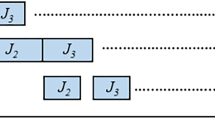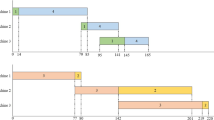Abstract
The paper considers a scheduling model that generalizes the well-known open shop, flow shop, and job shop models. For that model, called the super shop, we study the complexity of finding a time-optimal schedule in both preemptive and non-preemptive cases assuming that precedence constraints are imposed over the set of jobs. Two types of precedence rela-tions are considered. Most of the arising problems are proved to be NP-hard, while for some of them polynomial-time algorithms are presented.
Similar content being viewed by others
References
S.B. Akers and J. Friedman, A non-numerical approach to production scheduling problems. Oper. Res. 3(1955)429–442.
S.A. Borodich and A.V. Tuzikov, On the complexity of constructing time-optimal schedules for some two-stage service systems with non-fixed routes, in: Methods, Algorithms and Programs for the Solution of Extremal Problems, Minsk, Institute of Engineering Cybernetics, 1985, pp. 76–85 (in Russian).
S.A. Borodich and V.A. Strusevich, Scheduling a partially ordered set of jobs for a class of servicing systems, Izvestiya Akademii Nauk BSSR, Seriya Fiziko-matematicheskikh Nauk, 3(1986)19–22 (in Russian).
P. Brucker, An efficient algorithm for the job-shop problem with two jobs, Computing 40(1988) 353–358.
H.N. Gabow and O. Kariv, Algorithms for edge coloring bipartite graphs and multigraphs, SIAM J. Comput. 11(1982)117–129.
M.R. Garey and D.S. Johnson, Computers and Intractability. A Guide to The Theory of NP-Completeness, Freeman, San Francisco, 1979.
M.R. Garey, D.S. Johnson and R. Sethi, The complexity of flowshop and jobshop scheduling, Math. Oper. Res. 1(1976)117–129.
T. Gonzalez and S. Sahni, Open shop scheduling to minimize finish time, J. Assoc. Comput. Mach. 23(1976)665–669.
T. Gonzalez and S. Sahni, Flowshop and jobshop schedules: complexity and approximation, Oper. Res. 26(1978)36–52.
W.W. Hardgrave and G.L. Nemhauser, A geometric model and graphical algorithm for a sequencing problem, Oper. Res. 11(1963)889–900.
J.R. Jackson, An extension of Johnson's results on job lot scheduling, Naval Res. Log. Quart. 3 (1956)210–203.
S.M. Johnson, Optimal two and three production schedules with set up times included, Naval Res. Log. Quart. 1(1954)61–68.
E.L. Lawler and J. Labetoulle, On preemptive scheduling on unrelated parallel processors by linear programming, J. Assoc. Comput. Mach. 25(1978)612–619.
E.L. Lawler, J.K. Lenstra, A.H.G. Rinnooy Kan and D.B. Shmoys, Sequencing and scheduling: Algorithms and complexity, in: Handbooks in Operations Research and Management Science, Vol. 4, Logistics of Production and Inventory, S.C. Graves, A.H.G. Rinnooy Kan and P.H. Zipkin, eds., North-Holland, Amsterdam, 1993, pp. 445–522.
J.K. Lenstra, A.H.G. Rinnooy Kan and P. Brucker, Complexity of machine scheduling problems, Ann. Discr. Math. 1(1977)343–362.
T. Masuda, H. Ishii and T. Nishida, The mixed shop scheduling problem, Discr. Appl. Math. 11 (1985)175–186.
C.L. Monma, The two-machine maximum flow-time problem with series-parallel precedence constraints: An algorithm and extensions, Oper. Res. 27(1979)792–797.
C.L. Monma, Sequencing to minimize the maximum job cost, Oper. Res. 28(1980)942–951.
C.L. Monma and J.B. Sidney, Sequencing with series-parallel precedence constraints, Math. Oper. Res. 4(1979)215–234.
J.B. Sidney, The two-machine maximum flow-time problem with series-parallel precedence relation, Oper. Res. 27(1979)782–791.
Y.N. Sotskov, The complexity of shop-scheduling problems with two or three jobs, Eur. J. Oper. Res. 53(1991)326–336.
V.A. Strusevich, Complexity aspects of shop scheduling problems, Ph. D. Thesis, Erasmus University, Rotterdam, 1991.
V.A. Strusevich, Two machine super shop scheduling problem, J. Oper. Res. Soc. 42(1991)479–492.
W. Szwarc, Solution of the Akers-Friedman scheduling problem, Oper. Res. 8(1960)782–788.
V.S. Tanaev, V.S. Gordon and Y.M. Shafransky, Scheduling Theory. Single-Stage Systems, Kluwer Academic, Dordrecht, 1994.
V.S. Tanaev, Y.N. Sotskov and V.A. Strusevich, Scheduling Theory. Multi-Stage Systems, Kluwer Academic, Dordrecht, 1994.
J.R. Valdes, E. Tarjan and E.L. Lawler, The recognition of series-parallel digraphs, SIAM J. Comput. 11(1982)361–370.
Rights and permissions
About this article
Cite this article
Strusevich, V. Shop scheduling problems under precedence constraints. Annals of Operations Research 69, 351–377 (1997). https://doi.org/10.1023/A:1018997431986
Issue Date:
DOI: https://doi.org/10.1023/A:1018997431986




